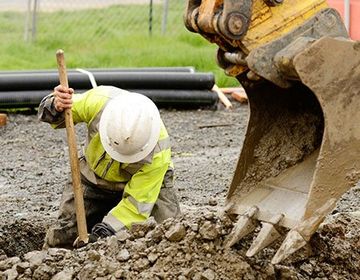Comprehensive Excavation Approaches: Understanding the Fundamentals for Success
The cautious preparation, precise execution, and meticulous attention to information called for in excavation tasks require a comprehensive strategy that includes different essential aspects. The true mastery lies not simply in understanding these fundamentals yet in effortlessly incorporating them to browse the complexities of excavation projects with finesse.
Recognizing Excavation Job Preparation

The initial stage of any excavation task is the planning phase, where vital decisions are made that can considerably impact the end result of the task. Understanding the project scope, timeline, and budget plan constraints is essential for producing a thorough excavation strategy that ensures the job's success.
One key element of excavation project preparation is the development of a detailed timeline that lays out the series of turning points, activities, and due dates. By meticulously thinking about all these variables throughout the planning phase, excavation projects can be implemented efficiently and properly, leading to effective results - dump truck companies in ohio.
Soil Analysis and Website Analysis
Conducting detailed soil evaluation and site analysis is a vital action in the prep work stage of any excavation task. Soil analysis includes establishing the composition, structure, and buildings of the dirt at the excavation site. This information is important for recognizing the dirt's bearing ability, moisture content, and potential for erosion, which are essential factors in figuring out the excavation approaches and tools required for the task.
Website analysis surpasses dirt evaluation and includes a more comprehensive evaluation of the general site conditions. This examination includes identifying any potential hazards, such as underground energies, ecological issues, or unstable terrain, that could affect the excavation process. By completely assessing the site, job supervisors can create efficient excavation methods that prioritize safety, performance, and environmental management.
Using innovative innovations like ground-penetrating radar, soil sampling, and drone studies can improve the accuracy and performance of dirt analysis and site analysis. Spending time and sources in these preliminary actions can eventually save time and prevent costly delays or difficulties throughout the excavation process.
Devices Choice and Usage
Efficient excavation tasks rely heavily on tactical equipment selection and application to guarantee optimal efficiency and efficiency. Selecting the right tools for the task is critical in making best use of effectiveness and minimizing downtime. Variables such as the type of dirt, depth of excavation, and task scope play a considerable function in identifying one of the most appropriate tools for the task at hand.

In enhancement to choosing the proper tools, correct application is vital to task success. Operators has to be educated to take care of the tools securely and effectively - septic ohio. Normal upkeep checks and prompt fixings aid protect against break downs and guarantee constant efficiency throughout the task
Precaution and Regulations Conformity
In the world of excavation tasks, focusing on safety and security procedures and compliance with regulations is vital to making sure a safe and secure and lawfully sound functional setting. Precaution include a variety of techniques, consisting of conducting look at these guys extensive site evaluations, implementing proper signs and barriers, and providing adequate safety training pop over to this web-site for all employees associated with the excavation procedure. Adherence to regulations, such as OSHA needs in the United States, makes certain that the excavation job meets the necessary requirements to safeguard employees, bystanders, and the surrounding setting.

Monitoring Progress and Adjusting Strategies
Just how can predict managers efficiently track the development of excavation projects and adjust their methods accordingly to enhance end results? Surveillance progression is important for ensuring that excavation tasks remain on track and satisfy target dates. Job supervisors can use different devices and methods to track progress, such as everyday progression reports, normal website evaluations, and advanced tracking technologies like drones and GPS tracking systems. By continuously keeping an eye on the project's improvement, managers can identify any kind of possible delays or concerns beforehand and take proactive steps to address them.

Conclusion
Finally, understanding the principles of extensive excavation methods is important for the success of any job. By recognizing project planning, assessing soil and website conditions, selecting proper tools, following safety regulations, and keeping an eye on progression, project managers can guarantee a effective and smooth excavation process. Carrying out these strategies will bring about successful end results and reduce prospective dangers or setbacks throughout the excavation job.
The preliminary stage of any type of excavation job is the planning stage, where vital choices are made that can dramatically influence the result of the project. Recognizing the job timeline, range, and budget constraints is vital for creating an extensive excavation plan that ensures the job's success.
How can project managers successfully track the advancement of excavation tasks and adapt their techniques accordingly to optimize results? By very closely monitoring progress and being ready to adjust methods, task managers can boost the general success of excavation projects.
By understanding project preparation, examining dirt and website problems, selecting ideal equipment, abiding with safety laws, and keeping an eye on progression, project supervisors can guarantee a smooth and efficient excavation process.